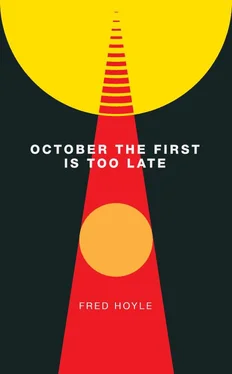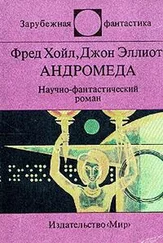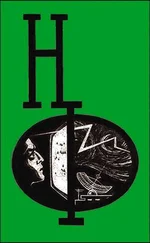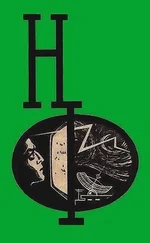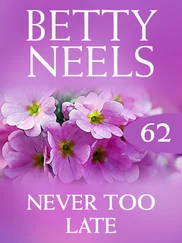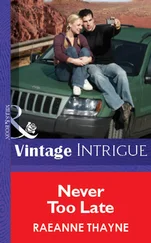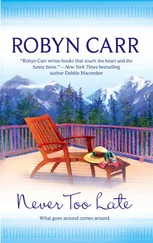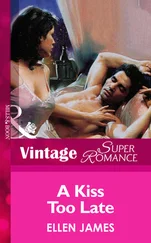This criticism I would have been entirely willing to accept if the audience had admitted the straightforward merit of what had been done. They didn’t. There was scattered applause mixed with boos and hisses. Momentarily nonplussed I failed to take a quick bow and to make a quick exit. The hissing increased. Suddenly I became coldly angry. With an imperious gesture I turned to the leader and shouted loudly, ‘Bar one!’ Such is the respect of a German orchestra for its conductor that the players all obediently turned back to the beginning. Before anybody in the audience realized what was going to happen the rolling bass chords started again. The shouting behind me held its own for a little while until the orchestra picked up volume. Then as the full chords broke loose the mob amounted to little more than a whisper in a storm. At the end they had their say, or rather their shout. This time it was quite full blooded. I was in no doubt of what to do. I bowed around the hall twice, shook the leader’s hand, patted him on the shoulder, and walked out.
As I made my way back to the hostel I fully intended to quit Cologne the following morning. Yet when morning came I saw no reason to run away like a whipped dog. I found it much easier to behave normally, as if nothing had happened, than I would have expected. My fellow musicians were only meeting me in small numbers at a time now. Perhaps for this reason they had lost something of the confidence of the evening before. Several of the critics went out of their way to tell me, more or less out of the back of the hand, how much they had enjoyed my piece. Well, well. I remembered being told, as a youngster, that if universal approbation represented a hundred per cent on a scale of appreciation, then to be universally well known, but disliked, was already worth fifty per cent. To be entirely unknown corresponded to the zero mark.
I did leave the Festival two days before its end, not under any compulsion, but because I got bored. Two weeks of caterwauling was more than I could take. So midway through the afternoon I found myself at the airport. It chanced that Alex Hamilton had decided to get out too. We travelled back together. Alex is the untypical Scot. He has a remarkable gift for floating through life. His musical style is modern, abstract, technically very good. His great gift, outside music, lies in avoiding doing the things he doesn’t want to do. He couldn’t understand why I had gone so deliberately out of my way to make trouble for myself. He didn’t criticize me directly. We sat together, Alex making lighter conversation than I was able to do myself. Every now and then he would stop talking and begin shaking with silent laughter. I stood it as long as I could and then said, ‘I’m glad you think it funny.’ It wasn’t a very worthwhile remark but it sent him into still more violent contortions. Then he patted me on the shoulder and said, ‘It was marvellous, just marvellous.’
We got into London airport more or less on time. Quickly we were into the reception hall and through immigration. Then came an unconscionably long wait in the customs hall. If the trend towards faster aircraft goes on long enough we shall end up by taking more time to unload the baggage than for the flight, I thought grumpily. A sudden slap on the back caused me to turn sharply, a cross look still on my face. It was a slim dark-haired man in his early thirties. Recognition came in perhaps half a second. ‘Thank goodness it’s you,’ he said, ‘for a second I thought I might have slapped the wrong back.’
It was John Sinclair. We’d been at school together. We had won scholarships to Cambridge in the same year, his in mathematics, mine in music. Besides his mathematics Sinclair had a natural liking for music. In our university days I was as much interested in the piano itself as in composition. The larger part of my musical education I got outside the lecture-room, by playing great quantities of music. I developed in those days the habit of riding through a composer’s works totally, symphonies, quartets, as well as straight piano music. John Sinclair used to spend many a spare hour in my rooms.
We were both interested in mountains. Already at school we had been out on one or two walking tours together. We kept it going at university. At the end of our third year we made a great trip to Skye. A party of four of us camped in Glen Brittle. We had a magnificent couple of weeks climbing in the Cuillin. The penultimate day was very wet. We spent it in the tents, cooking and talking. Our talk centred on what we were going to do the following year. Sinclair and I came to the tentative conclusion that we’d make a trip to the remarkable sandstone mountains of the extreme northwest. This plan never came to fruition. I won a scholarship to Italy in the following year. By the time I returned Sinclair was away in the United States. Although we had only met twice in the intervening years I had followed his career with more than a passing interest. The Royal Society just managed to scramble him into its Fellowship, at the age of twenty-nine, in time to forestall the award of a Nobel Prize. I followed what was going on as best I could in magazines like the New Scientist and the Scientific American. I knew he had contributed a decisive step in the physics of elementary particles, something of a highly algebraic nature.
I made the introductions.
‘Where are you in from?’
‘New York. And you?’
‘We’re just back from Cologne. Music Festival.’
Our bags came at last. Alex and I checked them through customs. I said to him, ‘Let’s wait.’ It was some minutes before Sinclair joined us. ‘How about a taxi into town, and having dinner together?’ he said. This was fine by me. I’d been a little shy suggesting it. When you haven’t seen a man for six years, when he’s gone a long way in those six years, you never know exactly where you stand. But it seemed that John hadn’t changed much, in spite of his towering success. He was thinner now than he used to be, and I would have said he’d got a slightly worried look about him. We took a taxi to my place, ostensibly for a drink. We had several drinks.
Dinner began to seem less important. Alex had developed quite a sway. He sat firmly down in the largest chair, gave a flowing gesture, with the hand that was not holding a glass, and said, ‘Music.’
‘What? Any preferences anybody?’
‘Anything, anything you like.’ He turned to John, ‘We don’t have preferences, do we? What we want is, music!’
I had not the slightest idea of what was going to come out as my hands came down on the keyboard. It was a Chopin nocturne, one I couldn’t recall having played for years. True I used to go quite a lot for Chopin in my late teens. Quite a bit has been written on the techniques of seduction. My not very humble submission is that most of such stuff is plain nonsense. For every girl of eighteen who can be broken down by feats of muscle power on the football field there are ten who will swoon into your arms at the sound of a Chopin waltz or mazurka. I have no doubt the same system works just as well at later ages, but for me at least it had come to seem too cheap and easy. Seducing a girl with your own music is all fair and aboveboard. Doing it with someone else’s had come to seem not quite proper, like shooting a sitting bird, or fishing with maggots. Anyway, out came the nocturne, somewhere from my subconscious memory. The alcohol stopped any worries about forgetting the way it went. As the piece glided to its end I had the feeling I had never played Chopin more perfectly. No doubt this was the effect of the alcohol too. Yet it is a mistake to think in terms of absolutes. It’s the way you feel, the way your audience feels, that really counts. Alex was getting quite high now, ‘More Choppy, please. More Choppy.’
Читать дальше
